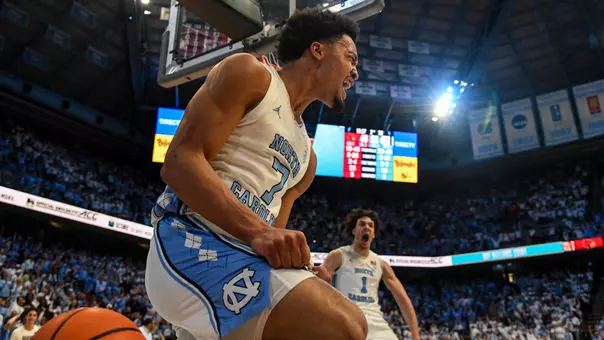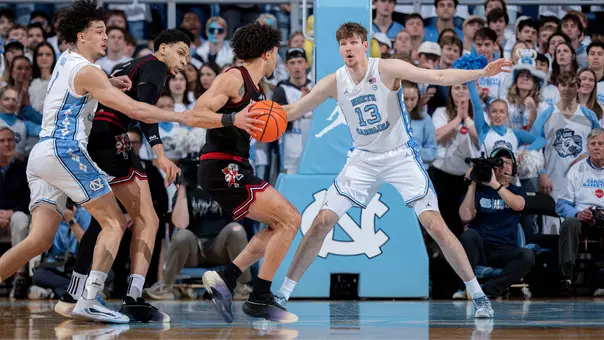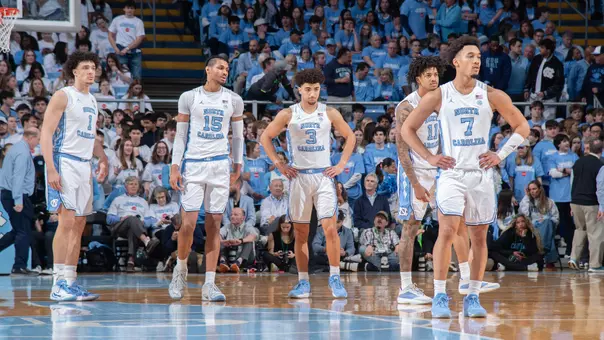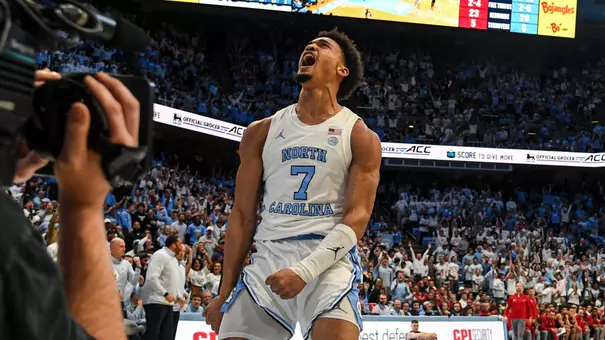University of North Carolina Athletics

Photo by: J.D. Lyon Jr.
Lucas: Trust
December 17, 2017 | Men's Basketball, Featured Writers, Adam Lucas
Carolina's win at Tennessee was a trust builder for everyone involved.
By Adam Lucas
KNOXVILLE, Tenn.—With under a minute left, Roy Williams gathered his five players who were on the court in a tight huddle around him.
"I trust you guys," the head coach told them. "That's why you're on the floor. I trust you five."
Sunday's win over Tennessee was every bit of a classic Tar Heel road victory. Carolina's prestige drew a big, raucous crowd of 21,678, attracted by the chance to see the famous blue argyle against a talented and 20th ranked homestanding Volunteer team. Students raced in two hours before tipoff to claim the best seats. The athletic department asked fans to wear color-coded shirts. Rumor had it the governor of Tennessee would be in attendance.
Stop me if you've heard this before: Tennessee started hot, the crowd loved it, but if you've seen enough of these Carolina games, you knew the Tar Heels were making just enough plays to make things interesting late in the game. Brandon Robinson hauled in a big rebound that turned into a Jalek Felton assist to Sterling Manley with two minutes left in the first half. Manley's big follow shot at the halftime buzzer made it a manageable six-point deficit.
Rick Barnes' squad maintained a lead for most of the second half, but you never got the sense that it was very secure.
As Barnes, a Hickory native, is well aware, this is how Carolina basketball became Carolina basketball. These types of games, these types of plays…and eventually, these types of wins.
December is supposed to be the time for tinkering, for seeing what works. This year, Williams has the luxury of already knowing a few things that work—Theo Pinson's creative offensive ability, Joel Berry II's leadership, Luke Maye's all-around play. In the final few minutes, a group of veterans played like veterans.
The eventual game-winning shot, a Kenny Williams three-pointer, came because Williams knew what Pinson was going to do before Pinson even did it. "I kicked the ball to Theo," Williams said, "and I saw him coming back (towards me) and I knew he was going to do a little handoff. I got myself ready to shoot because I knew I'd have an open shot because I knew he would screen."
All of those things, Williams knew without anyone telling him. He was moving before Pinson ever committed to the move. He knew it simply because he and Pinson have played together, when healthy, for the better part of three years. And Pinson, again with the ball in his hands in the final seconds of a close game, once again made a game-winning choice. About a minute earlier, Pinson had made another winning play by swatting the ball away from Grant Williams—who was about to make an offensive move to try and score—and out of bounds with four seconds on the shot clock; it eventually turned into a violation and a turnover. That's the kind of gamble a senior knows how to make, and one the head coach trusts one of his senior leaders to convert.
That was the predictable part of the victory—veterans making winning plays. What you might not have expected was exactly what Roy Williams said when his happy team assembled in the postgame locker room: "Our young guys grew up a little bit today."
Those young guys had been bludgeoned by Michigan State in Portland. Against Tennessee, a team with a similar brand of aggressiveness, they hit back. Manley had ten points and eight rebounds. Garrison Brooks had nine points and eight boards.
Brooks, a regular winner of the defensive player of the game award from the coaches early in the season, also contributed to solid defense against Tennessee star Grant Williams, who shot 7-for-15 and collected only four rebounds. Williams was just 4-for-10 in the decisive second half.
Quietly, though, one of Brooks' best defensive sequences came when he was switched onto a guard, the hot-shooting James Daniel, with three minutes to play in a one-point game. Seeing the mismatch, Daniel appeared to want to drive on Brooks, but the freshman stayed in front of him and forced him to give up the ball. The possession ended with a missed three-pointer.
"I was just focused on getting a stop," Brooks said. "I was trying to keep him in front of me, and I wanted to contest it if he took a jump shot."
When Roy Williams, who loves it when a big guy stonewalls a guard, watches that play on tape later tonight, it's going to do something important: it'll build a little trust in the freshman.
The sequence continued with Joel Berry II getting some dribble penetration and—as you would expect—drawing plenty of attention from the Volunteer defense. And who worked his way free under the rim? Brooks, who took the feed from Berry and laid it in, one of those plays you probably forget about in the whirlwind of Williams' three-pointer and Pinson's free throws, but that was important both on Sunday night and moving forward. Think about it: Berry, the Final Four Most Outstanding Player, already a rafters resident, passed to Brooks, he of the 62 career points, in a key situation. Sure, Brooks was open—but there are some teams where that pass doesn't happen.
"I think maybe that earns me some trust from Joel," Brooks said. "The fact that he was willing to pass me the ball when we were down one—at the time, I couldn't think about it. But now that I think about it, yeah, that was really big."
Yes it was. It's big to do it in December before you have to do it in February or March, and to do it with 21,768 people in the stands. This was the first exposure for the freshman class to an environment like this, to what happens when opposing crowds see Carolina walk in the door and smell a chance to beat the Tar Heels.
What they learned is something Roy Williams says every single year, and it might sound like a cliché, but he proves it over and over again. "Do what I tell you to do," he tells them. And when they do, games like Sunday's tend to happen.
All those little moves that seem insignificant—applying fullcourt pressure midway through the second half coming out of a timeout, then watching Tennessee commit a violation when the inbounds passer ran the baseline to try to get the ball in, or not calling a timeout when the Tar Heels fell behind by six a couple minutes later, or a late defensive trap call that created another Volunteer turnover—have a way of making the players believe.
"I thought in this situation he might do a lot of yelling," said Manley of his first experience with the Hall of Famer in a tight game. "But he's so poised late in a close game. He always refers back to the keys to the game, and he stays so poised, and that helps keep us poised."
Sunday's keys to the game—the three things Williams wrote on the locker room chalkboard before the tipoff—were rebounding, pressure and being strong with the ball.
A fourth was also important: trust. These types of wins don't just happen. There were multiple opportunities to fall apart on Sunday. Carolina refused to do it—because the head coach teaches the players, who execute what he tells them, who know how to help each other succeed. No one player tried to win Sunday's game alone, which is often a temptation in these settings. Instead, the seniors set up the juniors who helped the sophomores who taught the freshmen who listened to the coach who provided the blueprint. Any one of those ingredients doesn't happen, Tennessee gets a season-making victory. Instead, the Tar Heels got a win that will help them in February and March, and that will pay dividends every day for the rest of the season.
Remember, players and coaches believed last year's Arkansas game was important because it was the first win of that type the team had all season. They referenced it multiple times in later NCAA Tournament games. Tennessee was a similar type of win—but it came in December rather than March. Mark it down: sometime later in this season, Carolina's going to get a big win, and a Tar Heel is going to say they learned how to execute in the Tennessee game.
"A lot of it," Kenny Williams said, "is trust. We trust each other and we trust Coach. He tells us to do what he says and we'll come out on top, and that's what we do."
KNOXVILLE, Tenn.—With under a minute left, Roy Williams gathered his five players who were on the court in a tight huddle around him.
"I trust you guys," the head coach told them. "That's why you're on the floor. I trust you five."
Sunday's win over Tennessee was every bit of a classic Tar Heel road victory. Carolina's prestige drew a big, raucous crowd of 21,678, attracted by the chance to see the famous blue argyle against a talented and 20th ranked homestanding Volunteer team. Students raced in two hours before tipoff to claim the best seats. The athletic department asked fans to wear color-coded shirts. Rumor had it the governor of Tennessee would be in attendance.
Stop me if you've heard this before: Tennessee started hot, the crowd loved it, but if you've seen enough of these Carolina games, you knew the Tar Heels were making just enough plays to make things interesting late in the game. Brandon Robinson hauled in a big rebound that turned into a Jalek Felton assist to Sterling Manley with two minutes left in the first half. Manley's big follow shot at the halftime buzzer made it a manageable six-point deficit.
Rick Barnes' squad maintained a lead for most of the second half, but you never got the sense that it was very secure.
As Barnes, a Hickory native, is well aware, this is how Carolina basketball became Carolina basketball. These types of games, these types of plays…and eventually, these types of wins.
December is supposed to be the time for tinkering, for seeing what works. This year, Williams has the luxury of already knowing a few things that work—Theo Pinson's creative offensive ability, Joel Berry II's leadership, Luke Maye's all-around play. In the final few minutes, a group of veterans played like veterans.
The eventual game-winning shot, a Kenny Williams three-pointer, came because Williams knew what Pinson was going to do before Pinson even did it. "I kicked the ball to Theo," Williams said, "and I saw him coming back (towards me) and I knew he was going to do a little handoff. I got myself ready to shoot because I knew I'd have an open shot because I knew he would screen."
All of those things, Williams knew without anyone telling him. He was moving before Pinson ever committed to the move. He knew it simply because he and Pinson have played together, when healthy, for the better part of three years. And Pinson, again with the ball in his hands in the final seconds of a close game, once again made a game-winning choice. About a minute earlier, Pinson had made another winning play by swatting the ball away from Grant Williams—who was about to make an offensive move to try and score—and out of bounds with four seconds on the shot clock; it eventually turned into a violation and a turnover. That's the kind of gamble a senior knows how to make, and one the head coach trusts one of his senior leaders to convert.
That was the predictable part of the victory—veterans making winning plays. What you might not have expected was exactly what Roy Williams said when his happy team assembled in the postgame locker room: "Our young guys grew up a little bit today."
Those young guys had been bludgeoned by Michigan State in Portland. Against Tennessee, a team with a similar brand of aggressiveness, they hit back. Manley had ten points and eight rebounds. Garrison Brooks had nine points and eight boards.
Brooks, a regular winner of the defensive player of the game award from the coaches early in the season, also contributed to solid defense against Tennessee star Grant Williams, who shot 7-for-15 and collected only four rebounds. Williams was just 4-for-10 in the decisive second half.
Quietly, though, one of Brooks' best defensive sequences came when he was switched onto a guard, the hot-shooting James Daniel, with three minutes to play in a one-point game. Seeing the mismatch, Daniel appeared to want to drive on Brooks, but the freshman stayed in front of him and forced him to give up the ball. The possession ended with a missed three-pointer.
"I was just focused on getting a stop," Brooks said. "I was trying to keep him in front of me, and I wanted to contest it if he took a jump shot."
When Roy Williams, who loves it when a big guy stonewalls a guard, watches that play on tape later tonight, it's going to do something important: it'll build a little trust in the freshman.
The sequence continued with Joel Berry II getting some dribble penetration and—as you would expect—drawing plenty of attention from the Volunteer defense. And who worked his way free under the rim? Brooks, who took the feed from Berry and laid it in, one of those plays you probably forget about in the whirlwind of Williams' three-pointer and Pinson's free throws, but that was important both on Sunday night and moving forward. Think about it: Berry, the Final Four Most Outstanding Player, already a rafters resident, passed to Brooks, he of the 62 career points, in a key situation. Sure, Brooks was open—but there are some teams where that pass doesn't happen.
"I think maybe that earns me some trust from Joel," Brooks said. "The fact that he was willing to pass me the ball when we were down one—at the time, I couldn't think about it. But now that I think about it, yeah, that was really big."
Yes it was. It's big to do it in December before you have to do it in February or March, and to do it with 21,768 people in the stands. This was the first exposure for the freshman class to an environment like this, to what happens when opposing crowds see Carolina walk in the door and smell a chance to beat the Tar Heels.
What they learned is something Roy Williams says every single year, and it might sound like a cliché, but he proves it over and over again. "Do what I tell you to do," he tells them. And when they do, games like Sunday's tend to happen.
All those little moves that seem insignificant—applying fullcourt pressure midway through the second half coming out of a timeout, then watching Tennessee commit a violation when the inbounds passer ran the baseline to try to get the ball in, or not calling a timeout when the Tar Heels fell behind by six a couple minutes later, or a late defensive trap call that created another Volunteer turnover—have a way of making the players believe.
"I thought in this situation he might do a lot of yelling," said Manley of his first experience with the Hall of Famer in a tight game. "But he's so poised late in a close game. He always refers back to the keys to the game, and he stays so poised, and that helps keep us poised."
Sunday's keys to the game—the three things Williams wrote on the locker room chalkboard before the tipoff—were rebounding, pressure and being strong with the ball.
A fourth was also important: trust. These types of wins don't just happen. There were multiple opportunities to fall apart on Sunday. Carolina refused to do it—because the head coach teaches the players, who execute what he tells them, who know how to help each other succeed. No one player tried to win Sunday's game alone, which is often a temptation in these settings. Instead, the seniors set up the juniors who helped the sophomores who taught the freshmen who listened to the coach who provided the blueprint. Any one of those ingredients doesn't happen, Tennessee gets a season-making victory. Instead, the Tar Heels got a win that will help them in February and March, and that will pay dividends every day for the rest of the season.
Remember, players and coaches believed last year's Arkansas game was important because it was the first win of that type the team had all season. They referenced it multiple times in later NCAA Tournament games. Tennessee was a similar type of win—but it came in December rather than March. Mark it down: sometime later in this season, Carolina's going to get a big win, and a Tar Heel is going to say they learned how to execute in the Tennessee game.
"A lot of it," Kenny Williams said, "is trust. We trust each other and we trust Coach. He tells us to do what he says and we'll come out on top, and that's what we do."
Players Mentioned
UNC Baseball: Paulsen Homers Twice in 13-3 Win vs VCU
Thursday, February 26
THE ARENA DISCUSSION - Episode 1: Lee Roberts & Bubba Cunningham
Wednesday, February 25
UNC Baseball: Hull, Schaffner Lift Tar Heels Over NC A&T, 9-1
Tuesday, February 24
Chloe Humphrey Receives 2025 Honda Award - February 23, 2026
Tuesday, February 24












